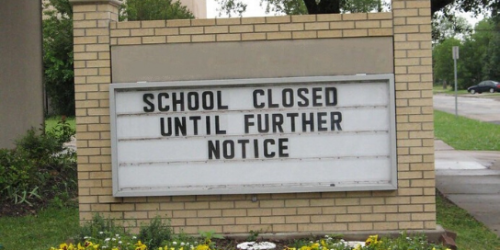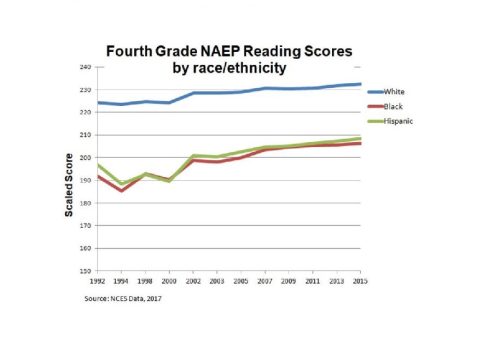Update on districts’ teacher policy responses to COVID-19
The 2019-2020 school year is coming to a close, but school district leaders will continue to face the challenges of distance learning as they plan for both summer school and fall openings.

The 2019-2020 school year is coming to a close, but school district leaders will continue to face the challenges of distance learning as they plan for both summer school and fall openings.

The settlement agreement in CA still tiptoes around the most likely reason these kids aren’t reading.

Is the reason Americans tolerate unnecessarily high rates of kids who never learn how to read yet another manifestation of institutionalized racism?

In journalist Natalie Wexler’s powerful new book, The Knowledge Gap, she sets out to make the case for the critical importance of a knowledge-rich curriculum.

If we want to increase the number of teachers who believe that the teaching profession is valued by society from the current abysmal 36 percent, one place to start is paying them like the professionals they are.

I know teacher evaluation is now considered toxic, but I’ve never been one to shy away from tilting at windmills.

Take your eyes off the pounding surf for a moment to read my top three interesting developments worth noting.

It’s reasonable to assume that a master’s degree in teaching should provide new teachers with a leg up compared to those who go through training as an undergraduate. Not so.

As school districts plan for the coming school year, many are already considering where to recruit a fresh crop of new teachers – teachers eager to put everything they’ve learned from preparation into practice.

We’ve all taken plenty of tests in our time—so surely any of us could figure out how to assess our students, right? Not so fast! Strong assessment practice requires training in how to design, implement, interpret, and use different forms of assessment and data.
If you’re anything like me, you can’t help but grow really discouraged at what seems like a lack of progress toward improving public education. I’ll admit there are days when I just want to throw in the towel.

This month, we analyze school calendars for the 2016-2017 school year to answer some key questions. Is school really starting earlier? How long is the school year for students and teachers?

Over the last few decades, the field of teacher education has heavily promoted the use and even the mandatory adoption by states of standardized assessments that can be used to judge how well a teacher candidate can deliver a lesson.
Observations from a School Turnaround Leader

Over the holidays, I ran into an old colleague from back when I was doing a lot of work in Baltimore during the 1990s. The conversation turned to NCTQ’s work in teacher preparation.
Every district wants to get a leg up on hiring the best new teachers. Want a tip? Get your pick of the teachers by starting before they even finish training.
The Good Behavior Game has nothing to do with classroom management; it has to do with behavior management and the two are separate entities. As long as we continue to subscribe to the notion that discipline is classroom management, we will never attain improved student achievement, which is the goal of NCTQ.

April’s Trendline is all about transfers and excessing, highlighting how districts prioritize transfers and how they decide where to place teachers when excessing occurs. Plus, we take a detailed look at mutual consent policies across the country.
This month’s Catching up on Contracts focuses on salaries and benefits in the five districts we reviewed. In four of the featured districts, Oklahoma City Public Schools, Omaha Public Schools, Long Beach Unified School District and Hartford Public Schools, the salary changes are nothing out of the ordinary.